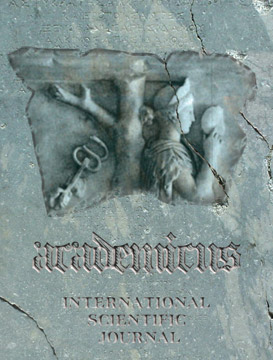Title:
Albanian migration during the post communist transition and the European integration in global era - An intercultural reflection
Author(s):
Abstract:
Migration is a human experience, which has arisen and developed in relation to the human society itself. In our era, immigration is associated with the integration and the globalization. Immigration is a modern intercommunications between cultures in a world increasingly with more multicultural, or in a world with a hybrid culture. Western multiculturalism as a space wherein the Albanian cultural integration moves. After the collapse of the communist system and coincidental that occurred the great things happening in the xxi century, the immigration can be a field study by the Transitology At the time when the crisis of philosophical thought is present, this phenomenon can be studied by a reflective philosophical thought (philosophy reflective) In this paper I am focused on Albanian emigration. Even and in the case of Albanians immigration is a similarity to the historical processes of Jewish people. Albanians have realized two tragic exodus mythical proportions: on xvi century to the Italy and on 90th years of xx century to the Greece The causes of this exodus were political reasons: In the first case (xvi cent.), was the Ottoman occupation of Albania. In the case of the 90th years of xx century, was the Albanian idolatry, atheist, and socialist totalitarian regime. Nowadays Albanian emigration continues, and the main cause is the economic and social. Integration as a cultural movement of the identity: Albanian integrating movement. Identity is a process, a movement where function three vectors: identity, being time and space. Integration is analyzed as a category which functions in relationship with identity Europe was more than an old house for Albanian emigrants. It was a new relationship. It was the new unknown culture. This road passes between assimilation and isolation. The most useful and the most effective vehicle of integration is the adaptation of immigrants. The integration and returning in home in time of globalization are not divided. On our days the key “returning in home” has a new dimension. In the global era between the individual and the fatherland (motherland) has a spiritual cultural relations. This relationship is there an ideal content. It is an eternal bond and is not as dependent on material factors. Integration of migrants passing through colliding positives and negative; progressives and regressive. The religion identity of Albanian is not any essential structural component of their identity. The religion of Albanians as a part of their culture. This tendency of European society is an integrating space for Albanians. So unlike all Muslims of other countries, Albanian Muslims are integrated quickly and easily to the European secularist environment.
Keywords:
Transitology, the modern migration (tragic exodus), the integration as Europeanization, modern man and the intercultural education
Full Text PDF:
References:
View complete reference list, click
here
Digital Object Identifier DOI:
The article's content ©Academicus™ Albanian migration during the post communist transition and the European integration in global era - An intercultural reflection
by
Prof.Dr. Agim Leka
is licensed under a Creative Commons
Attribution-NonCommercial 4.0 International License.
Presented:
May 2013
Included for Publishing:
June 2013
Published:
July 2013,
Volume 4,
Issue 8
Academicus International Scientific Journal is an Open Access Journal. This means that all content is freely available without charge to the user or his/her institution. Users are allowed to read, download, print, search, or link to the full texts of the articles in this journal without asking prior permission from the publisher or the author. This is in accordance with the BOAI definition of open access. Users are obliged to cite the source (Academicus International Scientific Journal) and the author, according to the international citation standards.
To learn more about the OA Policy followed by Academicus ISJ, read Journal Regulations
Academicus
International Scientific Journal
pISSN 2079-3715
eISSN 2309-1088
Address:
Sheshi i Flamurit, Rruga Muze
Al-9401 Vlorë, Albania
Tel: +355 68 60 60 555
info@academicus.edu.al
https://academicus.edu.al



 Scholar
Scholar
 Crossref
Crossref
